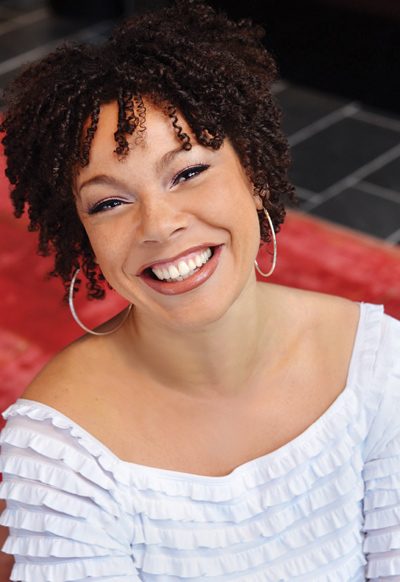Devi Ward gives us a dose of pleasure medicine for better sex.
“Someone telling you to ignore sexual pleasure is like someone saying you’re not supposed to pay attention to your right leg,” writer, sex educator, and certified Tantric healer Devi Ward says to me. “Our cultural conditioning encourages women to ignore pleasure, an essential aspect of ourselves. And it’s like, Why should I ignore my right leg? It helps me stand up! It helps me walk!” she says, laughing.
When it comes to sexual pleasure, women have been seriously wounded in our metaphorical leg. Our male-centric society promotes a widespread ignorance surrounding female orgasm and masturbation. This, combined with the horrendous acceptance of sexual violence against women in our culture, has had us hobbling along our sexual pleasure paths for centuries. Add in a lesbian/bisexual/queer orientation and we might just find ourselves on crutches.
In her book Shake Your Soul-Song! A Woman’s Guide to Self-Empowerment Through the Art of Self-Pleasure, Ward teaches us how to heal ourselves from this crippling sexual trauma through what she calls “cultivating self-pleasure,” a worthy self-exploration, she says, as our limping libidos could be hindering our sex lives (and our orgasms!) without our even noticing it.
“When I say sexual trauma, I don’t necessarily mean abuse or rape,” Ward explains. “I’ve had sexual trauma from just having sex. As women, we’ll store sexual trauma in our bodies from events such as having sex with someone we don’t want to have sex with, or feeling like we can’t speak up for our sexual needs and wants. Feeling shame from being told that you’re a bad girl for liking sex is a sexual trauma. Growing up in a society that teaches sexual fear and guilt is a sexual trauma. As lesbians, you’re taught there’s something wrong with your sexuality because it’s not normal. That’s a sexual trauma. And chances are, that’s stored in your genital tissue.”
Ward tells me about a woman who complained that every time her girlfriend touched her G-spot, it felt like stroking a piece of cardboard. Vaginal numbness and pain, the inability to reach orgasm, thinking you have no G-spot—these sex-negative symptoms are all too common. Culturally, women are encouraged to ignore these things, or to think they’re “just part of the deal,” to keep our heads down and do what Ward calls “fucking through it.” What if, Ward suggests, these unpleasant sex-negative symptoms are actually physical responses to sexual trauma?
“Trauma imprints in our cellular tissue and we hold it there, whether or not we’re aware of it,” she explains. “Traumatic events are shocks to the nervous system, and they get stuck in our tissues in a holding pattern. When we apply somatic healing techniques such as touch, movement, and breath awareness, it stimulates the cellular tissue to begin releasing this trauma. The human body is designed to heal itself, and pleasure is a mechanism of the body. Pleasure is medicine.”

Through the guidance of her book, Ward tells me, her “cardboard” client is now having regular, ejaculatory G-spot orgasms. But this kind of sexual healing doesn’t just happen overnight and certainly not after a few quick masturbation sessions. Ward explains that though it might feel nice when we simply “get off,” too often we’re merely scratching a sexual itch—focusing on gratification instead of pleasure. “Sexual gratification is more of a reflex,” Ward explains. “We may gratify a physical desire but still be left feeling emotionally empty inside. It doesn’t meet the deeper need, it isn’t regenerative. Pleasure has transformative qualities. It is physically designed to heal us.”
To truly achieve sexual healing, Ward says we must consciously cultivate what she calls the Four Forms of Pleasure—sensual, sexual, spiritual, and emotional—all of which profoundly benefit our physiological health. “When we experience the Four Forms of Pleasure, the natural chemicals that are released, such as serotonin and dopamine [responsible for feelings of euphoria, peace and happiness], make us feel better in every area of our lives. Of all the ways we can get our bodies to release these happy hormones—such as through exercise—the fastest and most powerful way to release these chemistries is through sex. This is a testament to the way the body is designed, to make sex healthy for us, not just physically but emotionally and spiritually as well.”
Taking a dose of her own medicine, Ward explains how the power of pleasure continues to heal her personal traumatic experiences. “When I first started the process of consciously using pleasure as medicine, I thought sexual communication meant moaning loudly and moving my hips to try to get partners to hit my clitoris. Now I can have between five and 30 orgasms with myself or my partner. Imagine an orgasm where you hit your pleasure peak for three straight minutes!”
Ejaculatory G-spot orgasms and three-minute climaxes sound pretty great, but healing sexual trauma through pleasure isn’t as simple as popping a daily dose of the Big O. Instead, Ward explains, it’s something we must foster in nonsexual areas of our life first. So, before you jump into the sack, start on the couch. “It’s been a habit for most of my life to endure being uncomfortable, even if it’s just me sitting on the couch with a lumpy cushion in my back. When I started cultivating pleasure in my life, I started asking myself, Why not always be at a 10, so every experience of my life can be exquisite? We deserve for every moment of our lives to be bliss! Know that you deserve to feel pleasure. Our culture teaches us that you’re a bad girl for enjoying pleasure. You have no idea how deeply that affects everything you allow yourself to experience during sex.”
Just like learning to walk again, transforming deep-rooted sexual trauma into pleasurable sex is all about taking baby steps. “You can’t have multiple orgasms if you’re thinking about doing the dishes,” Ward says. “So first, get present in your body. Second, become aware of pleasure in every area of your life. Simply enjoying your cup of coffee in the morning can be a pleasurable experience. Get off Facebook. The more present you are in other life areas, the more present you’ll be in the sexual areas. You can’t have one without the other.”
